|
 
COVER STORY | IN THE NEWS | FROM THE PUBLISHER | STAGE MATTERS | DIRT
ARTBEAT | TALK OF THE TABLE | THE HUM | CALENDAR
November 16, 2006
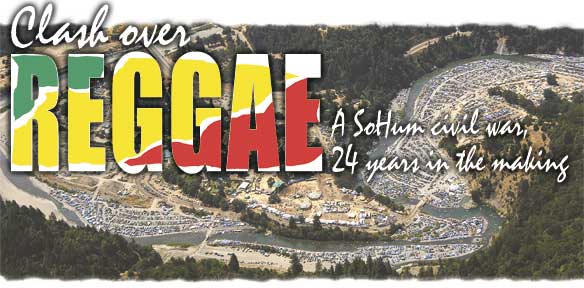
by BOB DORAN
On the Cover: Back of the stage at Reggae on the River,
2006. Photo by Bob Doran
Above: Reggae 2006 at Dimmick Ranch. Photo by Kim Sallaway.
MOST OF THE 15,000 OR SO
PEOPLE ATTENDING THIS SUMMER'S REGGAE ON THE RIVER NEVER SAW
THE BANNER, although many had seen it in the past. For years,
the backdrop for the festival stage included a large piece of
canvas with the word "Unity" scrawled in black over
splashes of red, green and gold. It was retired a few Reggaes
back, but this year someone pulled it out of mothballs and mounted
it on the back of the stage, perhaps as a means to connect the
festival's new location with its deep roots. If there was a catchword
for the festival over the years, unity was it.
As the festival approaches it's 24th year, many
in southern Humboldt are wondering what happened to the spirit
of unity that once drove Reggae. In recent weeks the community
has been torn apart by the revelation that the Mateel Community
Center, the nonprofit organization that ostensibly runs Reggae,
is in "a severe financial crisis" due to a shortfall
in revenue from the festival over the course of two years.
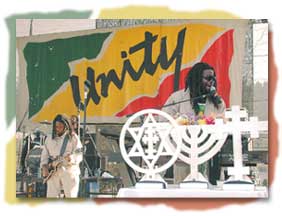 A
letter sent out by the Mateel board of directors and its executive
director, Taunya Stapp, explained that this year the event's
production company, People Productions, had projected a net income
from Reggae of $250,000, then on Oct. 21, the board had been
told that "perhaps there would be a profit of $16,000." A
letter sent out by the Mateel board of directors and its executive
director, Taunya Stapp, explained that this year the event's
production company, People Productions, had projected a net income
from Reggae of $250,000, then on Oct. 21, the board had been
told that "perhaps there would be a profit of $16,000."
This is a major blow for the Mateel, since the
festival typically provides the bulk of the organization's operating
budget. The board asked for community input, in particular at
the Mateel's upcoming annual meeting, set for this Friday, Nov.
17.
Right: Morgan Heritage performing in front
of the Unity sign at Reggae 2001. Photo by Bob Doran.
While some saw the letter as a cry for help, others
took it as a slap in the face to longtime Reggae producers People
Productions. Battle lines were drawn, and counter-accusations
showed up on the letter to the editor pages of the local papers
from People Productions' CEO Carol Bruno and her supporters and
staff.
The dispute heated up on "Thank Jah, It's
Friday," a morning talk radio show hosted by former People
Productions partner Paul "P.B." Bassis.
Responding to a caller, Bassis argued, "What
is so disturbing about Taunya Stapp's finger-pointing at People
Productions for the Mateel's unbelievable account of financial
woes -- this organization, and I will only speak to what I factually
know -- this organization received in proceeds from Reggae on
the River in a 10-year period of time, in the neighborhood of
$2.25 million. How that organization possibly squandered that
much money to run a community center in Redway is astounding.
It can only point to mismanagement of the organization."
Speaking directly to Stapp (who was not, in fact,
listening to the show) Bassis said she should be ashamed, concluding,
"You came to this community two years ago to take the job
of director of the Mateel, and if you take us for fools and dumb-asses,
you are absolutely wrong."
The story made waves throughout southern Humboldt,
old wounds reopened, longstanding resentments were stirred. This
reporter received a call out of the blue from "a concerned
Mateel member" who wanted to be sure the Journal
would have someone at the coming meeting.
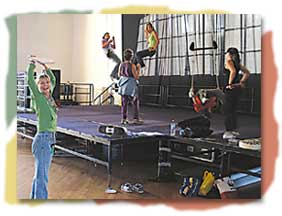 Asked
about her concerns, she said she'd rather not give her name or
speak on the record and handed the phone to Hoy Kersh, a Whitethorn
resident who has been an M.C. at Reggae off and on for years. Asked
about her concerns, she said she'd rather not give her name or
speak on the record and handed the phone to Hoy Kersh, a Whitethorn
resident who has been an M.C. at Reggae off and on for years.
"It's all about the money," said Kersh
bluntly. She hopes that "enough people show up at the meeting
that we could force Carol and P.B. to step down, somehow break
that contract.
"They're so arrogant that they're not going
to listen to anything we say. I hope we can bust them on fraud,
that we can show that they lied and cheated and stole our money.
Then the community could take Reggae back, maybe could start
off with a little smaller show and do it ourselves."
It's clear that unity -- at the very least,
between the Mateel and People Productions -- has gone out the
window. How did this come to pass, particularly given the fact
that Carol Bruno was a key figure in building the Mateel? What
will this rift mean for the Mateel Community Center and Reggae
on the River, two crucial Humboldt County institutions? For any
sort of understanding a look backwards is required.
Above: Joani Rose, director of Recycled Youth,
one of the programs at the Mateel. Photo by Bob Doran.
  
As the '60s became the '70s, hippies who'd lived
in San Francisco's fabled Haight/Ashbury District and other parts
of the country took to the hills, heading back to the land. A
fair number landed in the southern part of Humboldt County, where
a 40-acre parcel could be had for a low down payment, mainly
because no one else wanted what was seen as useless land. As
they grew in numbers, a counterculture enclave developed, and
with it a sense of community.
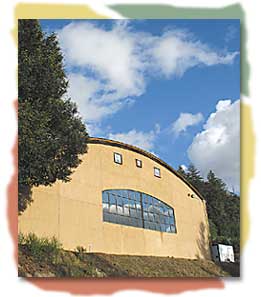 At
a Community Congress held in the Garberville Fireman's Hall in
the winter of 1978, the late Jim Deerhawk read a poem in which
he gave an identity to that community. Merging the names of southern
Humboldt's two rivers, the Eel and the Mattole, he declared that
the bioregion would henceforth be known as Mateel. The new name
was attached to the community center the back-to-the-landers
established in the Fireman's Hall. At
a Community Congress held in the Garberville Fireman's Hall in
the winter of 1978, the late Jim Deerhawk read a poem in which
he gave an identity to that community. Merging the names of southern
Humboldt's two rivers, the Eel and the Mattole, he declared that
the bioregion would henceforth be known as Mateel. The new name
was attached to the community center the back-to-the-landers
established in the Fireman's Hall.
In addition to its role as a gathering place, the
Mateel Community Center was used as a dancehall and performance
space for groups like the First Feet Dancers. The Winter Arts
Fair was established as an annual event, one where you could
buy tie-dyed T-shirts, hand-woven shawls or cups and bowls made
by local potters like John and Carol Bruno.
Then in 1983, tragedy struck. An arsonist set the
Mateel and several other buildings in Garberville ablaze and
the firehall burned to the ground. It was at that point that
the mythic story of Reggae on the River began.
Right: Mateel Community Center. Photo by Bob
Doran.
Carol Bruno has told the tale many times; she told
it again when the Journal met with her in the offices
of People Productions on Rusk Lane in Redway, a stone's throw
away from the Mateel Community Center, a beautiful hall that's
known in SoHum as "the house that Reggae built."
"We had an insurance policy," Bruno began,
"but we didn't have enough money to rebuild, and the [firehall]
location wasn't a spot where the building could be large enough
for a boogie place."
Bruno and her friend Shelby proposed putting on
a music festival featuring reggae music to raise funds to rebuild.
They called it Reggae on the River since it took place on land
along the Eel River not far from the Mendocino border, a place
called French's Camp owned by the Arthur family.
"The first year it lost money, and I was going
to get sued by the community," Bruno recalled. "The
second year I think we made $400 or $600. Then the third year
I think it made $1,800, and then it just went up from there.
But every year it worked we'd be, 'Yeah, it made money!'"
It took a five-year search to find just the right
place to rebuild the center. "Enter Evelyn Rusk, who lives
right over there today," said Bruno, gesturing toward the
window. "She and her husband owned the property that's now
the home of the Mateel."
Bruno recalled the "leap of faith" required
in committing to buy the property and build on it. "It was
amazing that it happened. Reggae kept making more and more money
each year and somehow we were able to accomplish it. It wasn't
without struggle. We didn't have much money at all. For quite
a few years when we did the festival everyone worked for free,
then everybody worked for really cheap wages. I was paid $6 an
hour for a lot of years."
As the years passed the hall grew, and with it
the festival. In 1991 (the first year this reporter attended)
it expanded from a one-day boogie to a two-day campover. By that
time it was drawing bands and reggae fans from around the world
-- and becoming a big business, one that required a year-round
commitment. Somewhere along the line, with assistance from local
lawyer Les Scher, Bruno licensed the name, Reggae on the River,
for the Mateel. "So it would always be protected,"
as she put it.
 Bruno
had a big job: She ran the festival -- "with help from a
whole lot of people," as she is quick to point out -- and
she also ran the Mateel. Bruno
had a big job: She ran the festival -- "with help from a
whole lot of people," as she is quick to point out -- and
she also ran the Mateel.
"I was never 'executive director,' I was director,"
she emphasized, differentiating her past role from the Mateel's
current structure. "We considered it more of a team. I was
the staff person responsible for making sure that things happened.
We had a hall manager, Richard Fisher. Then when he left for
Hawaii, P.B. [Paul Bassis] came on as hall manager."
In between Reggaes, Bruno and Bassis produced an
assortment of concerts at the Mateel. "We had to to keep
the cash flow going," Bruno noted.
Right: Carol Bruno of People Productions. Photo
by Bob Doran.
Bruno and Bassis were in positions of power, and
with that power came challenges, some merely jealousy and second-guessing,
but also serious questioning about the role the Mateel and Reggae
played in the community. The nonprofit Bruno headed was bringing
in some serious cash through Reggae, and she and Bassis were
paid employees who no longer received $6 an hour.
A survey circulated in the mid-'90s asked, "what
the community wanted the Mateel to be," as Bruno put it.
"The community said they didn't want it to be a production
company -- they wanted it to be a venue where events could be
held. That's when we left and formed our own company."
  
Bruno and Bassis formed People Productions as a
limited liability partnership in 1994. "We used our own
capital to produce events, and contracted to produce Reggae on
the River," said Bruno. "The Mateel [became] the community
center that the community had requested."
While Bruno had been in charge of producing Reggae
since the beginning, the name, Reggae on the River, and the festival
itself belonged to the Mateel, not to her. People Productions
used its own money to finance other events, reaping profits or
losses, but Reggae was still financed by the Mateel, and profits
went to the community center.
Kathryn Lobato Manspeaker was hired in 1995 as
the Mateel's executive director, filling the leadership vacuum.
She'd lived in SoHum since the early '70s, had been a Mateel
supporter since the Fireman's Hall days and brought with her
a long history working with local nonprofits.
"When I came on as executive director the
community center had been in the new location for a few years,"
said Lobato in a call from her Garberville home. "The external
part of the Mateel was finished, work was need on the interior.
There was still a sizable mortgage on the building and there
was a shoebox full of bills that were unpaid. We had debt. Reggae
wasn't making that much money. I think the year I came in it
made under $100,000 profit. We were really scraping by."
People Productions had just gone through its first
year producing Reggae and it was time to work out a new contract.
It was not easy, initially because the contractor/employee relationship
was brand new, but it never got easier.
"Working out that relationship has always
been problematic. I think at the core of it, it's because, on
paper, Reggae on the River belongs to the community center, every
aspect of it. They hold the trademark, they own all the contracts,
they sign all the permits with agencies, they hold the lease
with the landowner --  but,
because Carol was one of the founders, she feels a proprietary
interest in Reggae. but,
because Carol was one of the founders, she feels a proprietary
interest in Reggae.
"Now, if Reggae on the River was a for-profit
business, Carol would be an owner. She would have equity, she
would have a retirement coming, she would have all kinds of things
that she doesn't have, that she feels entitled to. And a lot
of people feel she should have those things. That is the core
issue, and it's been almost impossible to deal with."
Left: Mateel Community Center Executive Director
Taunya Stapp. Photo by Bob Doran.
By all accounts, Lobato's tenure as Mateel E.D.
was productive. She set about fulfilling the community vision
of a shift to more of a community center and less of a boogie
hall. Heading into the turn of the century, she brought in grant
funding from the California Arts Council, the National Endowment
for the Arts and foundations to start up youth programs and further
assess the community's desire for the organization. Even Bruno
praised her leadership -- "even though we had our differences."
Those differences came to the forefront periodically,
when the time came to renew the Reggae on the River contract.
Though the details of negotiations are not available to the public,
most people agree that they have long been fraught with difficulties.
After a particularly bitter contract battle in
2002, Lobato decided, "it was time for me to do something
else," and left her position. Three members of the Mateel
board, including the board president, refused to sign the 2002
contract, stating: "We have significant objections. We do
not believe this contract adequately protects the Mateel."
  
The search for another executive director resulted
in the hiring of Cindy Matheson, an experienced nonprofit administrator
from Boston who was clearly out of her element, and lasted all
of seven months on the job before resigning.
At that point the Mateel board decided to try a
management team with three staffers running the organization
together. Retired income tax specialist Rob Stern was recruited
to fill an open seat on the board around the time the tri-management
team was put in place. When it became clear that that model was
not workable, the decision was made to find a new executive director.
"I think the board was unanimous in the belief
that we needed a strong administrator," said Stern in a
call from his home in Redway. "We wanted somebody with a
community background with financial and management expertise."
Taunya Stapp fit the bill. "We knew that a
lot of her responsibility was going to be administering the contract
with People Productions for Reggae on the River. It's the biggest
financial deal the Mateel has going -- somebody has to be watching
the store for our side. But she was also in charge of diversifying
our funding base and I think she did a good job at that."
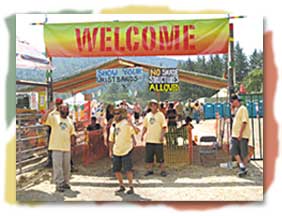 When
Stapp was hired at the end of 2004, she set straight to work
trying to figure out what was going on with Mateel finances,
basically by studying the books. A month and a half later she
met with the board. When
Stapp was hired at the end of 2004, she set straight to work
trying to figure out what was going on with Mateel finances,
basically by studying the books. A month and a half later she
met with the board.
Left: Entrance to Reggae 2006 at Dimmick Ranch.
Photo by Bob Doran.
As she explained in an interview in her office
in the house next door to the Mateel, "My analysis was,
'You've got a serious problem because you have a one-income stream
of revenues that could be jeopardized.' At that point the lease
[for French's Camp] was still fine, and they didn't see that
anything was going to happen to Reggae. I told them, 'You need
to diversify as fast as you can; you need to look at your core
competencies and at what this community needs. The Mateel needed
a long-term plan, a capital assets plan and an update of the
strategic plan.' The board debated it and came back to say they
agreed."
That was early 2005. At that point, Reggae business
was taking some unexpected twists. For one thing, People Productions
founder Paul Bassis had announced in December 2004 that he was
leaving to start his own booking, promotion and artist management
business, Infinite Entertainment.
Then the Arthur family, owners of French's Camp,
the site where Reggae has been held since the beginning, made
it known that they were not happy with their lease agreement
with the Mateel. While family matriarch Pat Arthur claimed she
wanted things "to be quieter," her son, Mark, let on
that, "We as a family want to develop the west side of the
river and that wasn't permitted. Personally, I would like to
see more events [at French's Camp]. Maybe not just one big event;
there could be four weekends, maybe a little hip-hop one weekend,
a little old school another, who knows what else."
With the French's Camp lease due to expire in September
2005, Stapp and her staff began looking for a new site for Reggae,
while, said Stapp, "trying to figure out why the lease went
bad. My time was going into dealing with the search and the Mateel's
resources were going into that. Then, suddenly, in June, Tom
Dimmick pops up and says,' Hey, what about my property?'"
The Dimmick Ranch, located just upriver from French's
Camp, seemed like a dream come true. "It made sense. It's
a beautiful place; it's located well. It seemed serendipitous,"
said Stapp.
"At that point we were into legal negotiations,
and not only about the lease. Carol Bruno approached the board
and said, 'I may have a year left on my other contract, but I'm
not going to do this [work on the move] unless you renegotiate
my contract.'"
Paul Bassis had reentered the picture, serving
as negotiator for Dimmick. Stapp found herself simultaneously
overseeing negotiations for the lease with Dimmick while negotiating
a new contract with Bruno to operate the festival, one that included
an $180,000 fee for People Productions. (The fee, which goes
to Bruno and does not include People Production staff work for
Reggae, went up to $185,000 in 2006.)
When Reggae 2005 came and went, net proceeds proved
to be less than expected. As Bruno explained, "It was pretty
much across the board, everything cost more. That was mostly
inflation hitting Reggae on the River. Everything cost more.
Every single thing went up. Except ticket prices."
According to Stapp, the Mateel made a net profit
of only $103,000. "We were anticipating something more like
$240,000," she said. "That was what we had budgeted.
And that wasn't the move year -- this was the last year at the
old site."
Regarding Bruno's explanation of the shortfall,
Stapp said, "It sounded a lot like what we've been told
about this year: high expenses, unexpected expenses. You know,
'Whoops.' The other thing they said was, 'We've always expected
Reggae monies are eventually going to decline, and the Mateel
shouldn't have counted on the money.'
 "We
didn't find out [about the 2005 shortfall] until September or
October. By that time we had run our budget on our anticipated
revenue projection, so we had to go to our reserves to cover." "We
didn't find out [about the 2005 shortfall] until September or
October. By that time we had run our budget on our anticipated
revenue projection, so we had to go to our reserves to cover."
While the shortfall was a hard hit, things got
worse. As Stern pointed out, you could say that that $103,000
profit was really no profit at all. "The Mateel had to spend
around $100,000 out of its coffers to take the equipment and
supplies off of the Arthur property, since our lease with them
had expired," he said.
Right: Crowd at Reggae 2006. Photo by Bob Doran.
  
Reiterating his support for Stapp's role in negotiations,
Stern noted, "One of the changes in the [most recent] contract
has to do with our need to have better accounting and budget
controls. A lot of accounting rules in the contract were basically
not followed.
"They [People Productions] keep saying a budget
is not a promise. But when the board approved the budget last
spring, it showed a $288,000 profit. I grilled them, asked, 'How
certain are you? You have this new permit, are you asking for
enough tickets?' They asked that we rely on their professional
expertise to be able to produce. Then in July we got a budget
update that raised [the expected profit] to $309,000, that [took
us] straight into Reggae on the River."
"We revised the budget at the end of July,"
said Bruno. "We added some bars and crafted different ways
to make more money for the festival."
As People Productions Chief Financial Officer Suzie
Mattila put it, at that point the projections were "optimistic."
That was just before the time Mattila calls "the vortex,"
as festival weekend arrives and with it a series of financial
surprises.
Bruno mentioned a few: an RV that someone smashed
into a tree, new demands from county inspectors for the wastewater
system and the backstage kitchen, more security for Piercy, 50
cars that had to be towed, a larger volume of trash than anticipated,
requiring additional dumpsters and larger payroll for the recycling
crew.
"I've asked friends who are promoters in the
city, 'Is it just us doing this wrong? Is there a way to accurately
predict [expenses]? You know what the response was? 'Welcome
to the music business.'"
As Mattila described it, the weekend of the festival
is always a blur of money in and money out, bills paid onsite
and cash income from T-shirt sales, the beer booth, camping,
etc., deposited in the bank.
"I've got all that information, but it isn't
collated and it isn't in the computer, so I'm thinking maybe
we did well enough to compensate for some of the overages. Who
knows? About a month later I find out."
According to Bruno at the beginning of September
2006, "We notified them that it looks like the bottom line
will not hold. We told them, 'We need to have a meeting,' but
they were doing the Hoedown [a Mateel-produced concert at Benbow
Lake], so they couldn't meet with us until Sept. 26."
"We never heard another word about how all
these costs were piling up," said Stern. "It wasn't
until a month after Reggae that we started getting inklings.
When we got word that it was down to $16,000, that was pretty
drastic.
"This was a little hippie festival that grew
way, way big, into a $3 million affair. And when I hear from
Suzie Mattila that there's this huge 'vortex' starting in July
and she don't know what's happening until she puts everything
in the computer, that makes me nervous."
  
Mattila says she's looking at this as her last
Reggae as People Productions CFO -- maybe. "Let's just say
I'm retiring if I have to work with the Mateel again," she
concluded. "If I don't have to work with them, I might stick
around."
"And I think that pretty much goes for the
entire staff here," said Bruno.
She was not sure exactly what will happen at Friday's
meeting, or even whether she'll be presenting her usual report
on the festival. "We haven't had any communication from
them."
Bruno doesn't like to think about the potential
of the Mateel closing its doors for lack of funds. "That
would be a real drag. We all love the Mateel. Gosh, you're talking
to one of the founders."
What happened to the spirit of unity? What does
the word unity mean at this point? Bruno is quiet for a long
time thinking. "I think unity still exists," she began,
then Mattila interjected saying, "My basic feeling is that
somebody from out of our community came in here, had a board
that didn't know what they were supposed to do, came in like
gangbusters saying People Productions had to be brought under
control. She convinced them they would be audited and lose their
homes if they didn't do what she told them they needed to do.
That's certainly not our style. The whole board is convinced
that we're not doing it the right way and that their director
knows how it should be done."
"And," said Bruno, "they feel no
need to communicate with us. It's been a history of obstructionism,
of bad communication, of one drama after another."
Another People staffer, Katy Stern, sticks her
head in the door. "How would you classify it, Katy?"
asks Bruno.
"Disrespectful," says Stern.
"Unity requires respect," says Bruno.
"They don't trust us."
If the Mateel and People Productions can't come
to agreement to work together, what happens to Reggae? "I
don't know what the Mateel's plans are," said Bruno. "They
don't talk to us."
By chance, Paul Bassis was visiting People Productions'
office when the Journal spoke with the staff there. He
offered his own solution to the crisis: The immediate resignation
of the Mateel's executive director and the entire board of directors,
a clean slate.
"My disappointment with the way the Mateel
has been managed has gone on for quite some time," he said
later. "There are a lot of people who have worked long and
hard on Reggae on the River who are very upset with this board
of directors and its executive director, who seems to be the
tail that's wagging the dog."
  
Down the lane at the Mateel, Stapp is sticking
to her guns. "The money that went into this hall, the money
that went into French's Camp, the money that went into Tom Dimmick's
site, it all came from the community. The fact is, all of this
is central to this community. Reggae on the River is huge. I
think all options need to be examined.
"To me, this is not about People Productions
and the Mateel, this is about the sustainability of the Mateel
and what people want from it for the future. With planning we
can avoid this sort of crisis. Unfortunately, because of all
the politics and the social nature around this -- and the nature
of the contractual limitations -- we have to do this battle first."
Could the Mateel put on Reggae without Bruno and
People Productions? No one really wants it to come to that, but,
said Mateel board member Stern, "I can't believe they're
the only company in the world that can do it. They do have a
lot of support in the community. A lot of people love Carol Bruno
and P.B. and all the things that have been done over the years.
The Mateel would find itself in a difficult place if that relationship
would just end. That doesn't mean we haven't discussed what might
happen if they no longer would produce [the festival].
"The Mateel has never done anything to try
and terminate the contract. The Mateel doesn't have a plan to
terminate the contract. The only suggestions of a termination
of the contract have come from Carol Bruno."
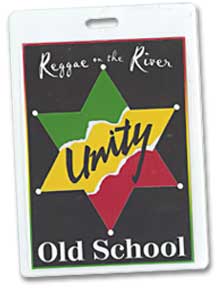 Is
Stapp considering resigning? She laughs at the question and says
no. "If the entire community says, 'Taunya we want you to
go,' I'll say bye. You know they've taken out three administrations
here. It's got to stop somewhere. I'm not here because it's fun,
and I can tell you I'm not here for the money. I get $32,000
a year for this job. I have a second job just to survive. Is
Stapp considering resigning? She laughs at the question and says
no. "If the entire community says, 'Taunya we want you to
go,' I'll say bye. You know they've taken out three administrations
here. It's got to stop somewhere. I'm not here because it's fun,
and I can tell you I'm not here for the money. I get $32,000
a year for this job. I have a second job just to survive.
"The thing is, the last thing the Mateel Community
Center needs is another executive director being run out on a
rail. If they have legitimate concerns, bring 'em. I can answer
every one of their questions. This is a public organization.
I'm accountable to the public and the members.
"This hasn't happened overnight. This problem
is 20 years in the making. We need to have the community tell
us what they expect of the Mateel Community Center's largest
asset. What kind of return? How do you want us to use this? We
can't do this by ourselves anymore. We need the public's input.
We need to resolve this. We need to do the work."
What happens next? Only time will tell. A couple
of alternatives to the current situation have been offered: licensing
the Reggae on the River name to Bruno, or selling it to her outright.
Bruno said she'd consider either. Stapp is waiting for direction
from the Mateel membership.
One thing for sure, the meeting at the Mateel Friday
at 5:30 will be contentious. According to the press release from
the Mateel, the public is invited to stick around "after
the meeting wraps up at 8 p.m. for good times and great music
at the end of the year Community Jam party." It's hard to
say if the spirit of unity will prevail at the meeting. Maybe
it would help if everyone could boogie together after the battle
is over.
Above: Tag photo by Kim Sallaway.
  
TOP
COVER STORY | IN THE NEWS | FROM THE PUBLISHER | STAGE MATTERS | DIRT
ARTBEAT | TALK OF THE TABLE | THE HUM | CALENDAR
Comments? Write a
letter!

© Copyright 2006, North Coast Journal,
Inc.
|